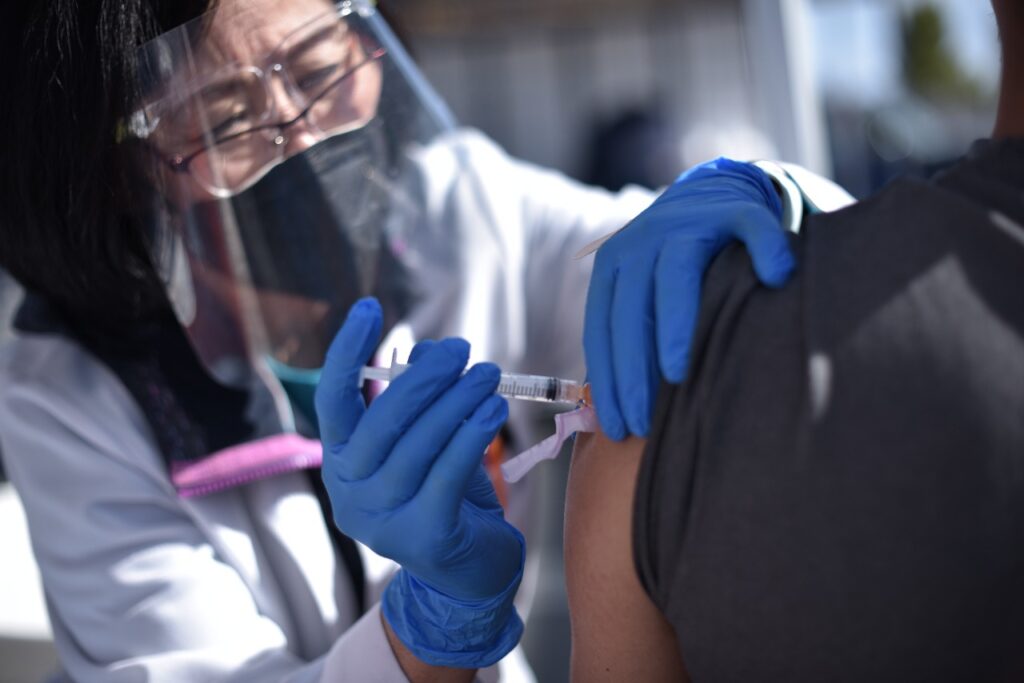
Despite the growing wave of infections and deaths of older adults from the Omicron variant in the U.S., a large percentage of this population is still not receiving boosters of the COVID-19 vaccine.
In California, 70 percent of deaths caused by COVID-19 have been persons 65 years of age or older, while 83 percent of this group has had their first series completed, only 76 percent have obtained a booster and only 29.5 percent have both.
Experts gathered at a conference organized by Ethnic Media Services to discuss the danger posed by COVID-19 to older adults, as well as the importance of their receiving full vaccination against the virus.
Sara Tartoff, an infectious disease epidemiologist, commented that "with the three doses we have seen consistent protection against hospitalization" and that the vaccine not only prevents the virus from spreading, but also reduces the probability that the affected person will be taken to a hospital or die.
"People who don't have the vaccine are 5 times more likely to get COVID-19, 7 times more likely to end up in the hospital and 10 times more likely to die," noted Denny Chan, managing attorney for Justice in Aging, so it is critical that both caregivers and healthcare providers encourage their family members and patients to get the full vaccination schedule, as well as their boosters.
Chan also pointed out that at the beginning of the vaccination there was a shortage and little accessibility to inoculation, however, today there are more vaccines and different ways to obtain them, in addition to studies that show that they work.
For his part, Tartoff commented that it is vitally important that older adults and immunocompromised individuals receive primary doses and boosters of the COVID-19 vaccine, as immunocompromised patients are at higher risk of severe complications from the disease.
In relation to immunocompromised patients, the experts' recommendation is that they should receive at least two doses before the first booster, which is provided at least 5 months after the primary series, while the second booster is applied four months after the first.
Denny Chan noted that older adults listen to their doctors or healthcare providers, as these are the people they look to as experts, so it is critical that the medical community encourage patients to receive the boosters as a way to protect themselves and those around them.
Paxlovid, an alternative to prevent the effects of COVID-19?
The antiviral treatment developed by Pfizer BioNTech, Paxlovid, consists of two drugs that are administered for five days after the first symptoms of COVID-19 disease.
According to the pharmaceutical company, the treatment has achieved an 88 percent reduction in the risk of complications such as hospitalization or death in high-risk adult patients; however, this treatment is only available under emergency use authorization, which is why the company requested approval for generalized use from the Food and Drug Administration (FDA).
Tartoff noted that, with Paxlovid, symptoms are suppressed or repressed, but in some cases people may become symptomatic, or even after treatment patients may test positive for COVID-19, however, he also commented that this phenomenon has happened with other antiviral treatments.
Finally, he commented that although it is possible that symptoms may rebound after treatment, it prevents severe complications, so "Paxlovid is still recommended and there do not seem to be worrisome results".
Support for caregivers
Roberto Velazquez, president and CEO of the Southern California Caregiver Resource Center, shared his concern about the risk that COVID-19 poses to older adults and immunocompromised individuals, but also for those who perform caregiving work.
He noted the importance of connecting family caregivers to services provided by the Southern California Caregiver Resource Center, as 48 percent of family caregivers are between the ages of 48 and 64, while 70 percent receive no help, 40 percent have poor health conditions or depression, and 35 percent report feeling lonely.
The COVID-19 pandemic brought great changes in the way of life and family caregivers have faced both health and emotional complications due to the lack of support for this sector of the population. In that sense, Velázquez pointed out that virtual services have been implemented to help caregivers, as well as follow-ups to know the health status of people and their needs.
Finally, Velázquez invited the caregivers to access the site www.caregivercalifornia.org/ for more information about the supports and Resource Centers that meet their needs.
Where to get COVID-19 boosters in California
For information about the suppliers, interested parties can visit the following site https://myturn.ca.gov/ and if they do not have access to computers or the Internet, they can call My Turn at 833-422-4255.
In addition, you can obtain information about the California Department of Aging by visiting www.aging.ca.gov or by calling 1-800-510-2020.
You may be interested in: Vaccination against COVID-19 in children under 5 years of age will reinforce community-wide protection


